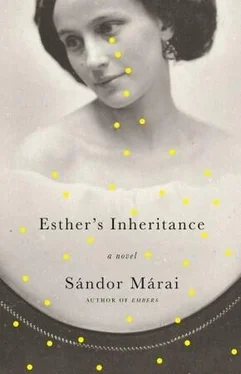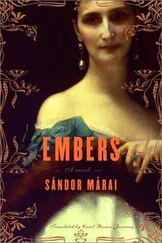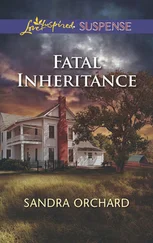“No,” he said, and coughed. “No, that is not the only reason. No, Esther, I had to talk to you one last time.”
“I have nothing left,” I said involuntarily, somewhat daringly.
“I don’t need anything anymore,” he answered, evidently not insulted. “Now it is I who want to give you something. Look here, twenty years have passed, twenty years! There will not be many more twenty years like that now, these may be the last. In twenty years things become clearer, more transparent, more comprehensible. Now I know what happened, and even why it happened.”
“How repulsive,” I said, my voice breaking. “How repulsive and ridiculous. Here we sit on this bench, we who once mattered to each other, talking about the future. No, Lajos, there is no future of any kind, I mean for us. Let’s get back to reality. There is something, a quality you are unaware of: it is a kind of modest dignity, the dignity of bare existence. I have been humiliated enough. Just talking about the past is humiliating. What do you want? What’s the idea? Who are these strange people? One day you pack, round up some people and some animals, and arrive in the grand old manner, with the same old words, as if you were obeying a call from God…but people know you here. We know you, my friend.”
I spoke calmly, with a certain ridiculous pomposity, pronouncing each word clearly and firmly as if I had been composing the speech for some time. The truth was I hadn’t composed anything. Not for a moment did I believe that anything here could be “put right,” I had no wish to fall into Lajos’s arms, I didn’t even want to argue with him. What did I want? I would like to have been indifferent. Here he is, he has arrived, this was just another episode in the peculiar pageant of life, he wants something, he’s up to something, but then he’ll go away and we will go on living as before. He no longer has any power over me! I felt and looked on him, safe, superior. He no longer has any power over me in the old sentimental sense. But at the same time I noticed that the excitement of this first conversation was far from indifference; the passion with which I spoke was a sign that there still existed a relationship that was far from fanciful, affected, or imagined, a relationship that was not mere moonshine, memory, or nostalgia. We were talking about something real. And, since it was vital, after so much mist and fog, to find a toehold in reality, I answered quickly without choosing my words.
“You have nothing to give me. You took everything, ruined everything.”
He answered as I expected him to.
“That’s true.”
He looked at me with clear gray eyes, then stared straight in front of him. He pronounced the words childishly, with an air of wonder, as if someone had praised him for passing an exam. I shuddered. What kind of man was this? He was so calm. Now he was looking round the garden examining the house appraisingly, like an architect. Then he began a conversation.
“Your mother died there, in the upper room, behind closed shutters.”
“No,” I said, thinking back. “She died downstairs in the parlor that Nunu now occupies.”
“Interesting,” he said. “I had forgotten.”
Then he threw away his cigarette, stood up, took a few firm strides to the wall, and tapped the bricks, shaking his head.
“A little damp,” he said in a disapproving but abstract tone.
“We had it fixed last year,” I said, still lost in my memories.
He came back to me and looked deep into my eyes. He remained silent for a long a time. We gazed at each other under half-closed eyelids, carefully and curiously. His expression was solemn now, devout.
“One question, Esther,” he said quietly and solemnly. “Just one question.”
I closed my eyes, feeling hot and dizzy. The dizziness lasted a few moments. I put out my hand as if to defend myself. It’s starting, I thought. My god, he wants to ask me something. But what? Maybe he wants to know how the whole thing happened? Whether it was I who lacked courage? No, now I have to answer. I took a deep breath, ready to answer his question.
“Tell me, Esther,” he asked quietly, soulfully. “Does this house still have a mortgage?”
T he events of the morning, at least all those that followed this last sentence, have grown a little confused in my mind. “Mister” Endre chose that moment to come over. Lajos was confused and started lying, very loudly. Like someone who wants to overcome his fear by shouting, he began in high C with false geniality and a hollow superior air that had no effect on Endre. He grabbed Endre’s arm in “dear old friend” manner and regaled him with some amusing anecdotes, behaving entirely as if he were a warmly awaited, high-ranking guest in the house of his social inferiors. Endre calmly heard him through. Endre is the one man in the world Lajos fears, the one utterly impervious to his magic, who has an inner indifference to the kind of rays and spells that, he believes, emanate from Lajos and affect everything, even animals and inanimate objects. Endre listened carefully to Lajos, fully aware of his professional secrets, knowing how he performed his conjuring tricks, quite prepared for Lajos to produce the national tricolor flag from his hat or make the fruit bowl disappear from the middle of the table. He listened with polite attention, without rancor, clearly interested in what Lajos had to say. It was as if he himself were saying: Show me another trick. As for Lajos, he took a brief rest between tricks, flicking the odd careful sidelong glance at Endre.
I think I was the only one to spot the panic. Tibor and Laci were absorbed by the sheer beauty of the performance. Later, in the afternoon, I learned that little Éva had also noticed Lajos’s confusion. Endre seemed to know some simple undeniable truth with which he could pin Lajos down anytime he chose. But he was not mocking, nor was he in the least unfriendly.
“So, Lajos, you’ve come,” he said, and they shook hands.
That was all. Lajos gave a nervous laugh. No doubt he would have worked with fewer constraints had there been no witnesses to his moment of departure. But ultimately, as we knew, it had been he who had invited Endre “in an official capacity.” He had expressly requested, in writing, that Endre should not be absent that day, since he wanted to talk to him. Endre came with Lajos’s letter of invitation in his pocket and stood in the garden, fat and placid, mildly blinking, patiently listening to Lajos without any sense of superiority, with the unshakable confidence of people who disdain the use of their full powers, knowing that one glance, one raised admonitory finger, and Lajos would immediately fall silent, slink away, and the show be over. Nevertheless, it seemed that Lajos could not do without this inconvenient witness. It was as if, after a long internal struggle, he had decided to face the truth — Lajos having always regarded Endre as the representative of truth, remorseless as judge and witness, a ruthless, antagonistic object to whom Lajos’s spells were like water off a duck’s back — and say: Let’s get this over and done with. That is how Lajos regarded the aging figure of Endre.
It was only some three or four years since Endre had aged. Everything that was serious and heavy in his appearance and nature, the mysterious resistance to the world that never let anyone get close to him, the priestly air and the silent watchfulness that was characteristic of him from his earliest youth, sometimes made it hard, even for a stranger, to connect with him. He wasn’t exactly unfriendly, it was just that one always felt he knew something about the world that defied all its laws and that he kept that secret to himself. His goodness was heavy, cautious, and clumsy.
Читать дальше












